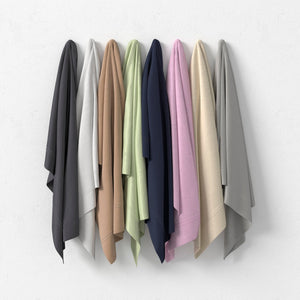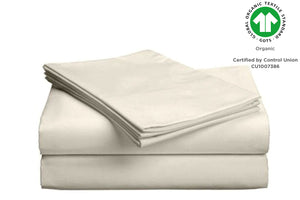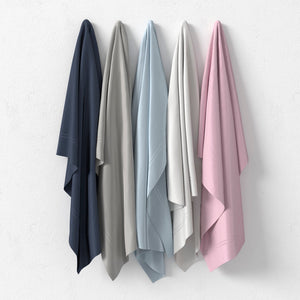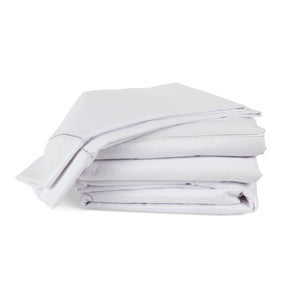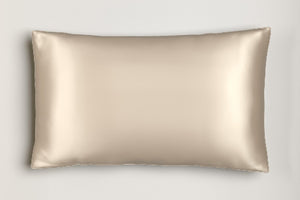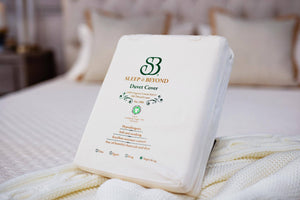Luxury Sheets & Linens
Soft, gentle eco-friendly sleep at the right price.
$248.00 $185.00 - $330.00
$224.00 $168.00 - $327.00
$295.00 $220.00 - $390.00
$74.00 $55.00 - $95.00
$149.00 $112.00 - $131.00
$211.00 $169.00 - $259.00
PlushBeds Luxury Sheets & Bed Linens are Sustainable
PlushBeds is your go-to destination for bedding, and our luxury sheet sets are a must-have addition to your bedroom. Our bed sheet sets are available in a variety of sizes, styles, and materials to meet your needs. All of PlushBeds sheet sets are either eco-friendly, organic, natural, or vegan. This is because we aim to not only to be your one-stop-shop for fabulously comfortable bedding options, but also a resource for sustainability. It’s who we are, and what we do. It's the closest we can come to guaranteeing a good night's sleep.
What Our Sheet Sets Include
All of our sheet sets contain a flat sheet, a fitted sheet, and either one or two pillow cases (depending upon the mattress sizing). The sizes include everything from Twin all the way through Split California King and Split Queen. The fitted sheets are designed to fit snugly over your mattress. The flat sheets provide a smooth, flat surface for you to lie on, ensuring maximum comfort. The pillowcases come in Standard, Queen, and King sizes to fit your pillows. Every order includes free shipping.
The Assortments
Rayon from Bamboo, TENCEL, Brushed Microfiber, and Organic Cotton are the choices we offer for our luxury sheets. Our Bamboo Sheets are soft and silky, and thermoregulating. They are ideal for sensitive skin. Our TENCEL sheets, otherwise known as vegan silk sheets, are made entirely from eucalyptus, Eucalyptus trees use 10-20 times less water for growing than cotton does. TENCEL is hydrophilic, which means it absorbs moisture away from the skin. Our Brushed Microfiber Sheets keep you warm and cozy. They retain warmth well, and won’t pill or shrink. They also wick away moisture. These luxury sheets are similar in feel to flannel. Last, but not least, is our Organic Cotton Sateen Sheets. Even though these luxury sheet sets are lightweight, they are strong and durable. They are GOTS certified organic, and are 300 thread count sheet cotton. They are also hypoallergenic and moisture-resistant.
Beyond Sheet Sets
Beyond sheets, in our bedding collection we also offer an Organic Cotton Sateen Duvet Cover. It’s always better to sleep with organic materials whenever you can. After all, you’ll be spending 1/3 of your life in bed. These duvet covers are GOTS certified organic cotton, and the quality rivals the quality found in five-star hotels. Interested in silk? Then we have just the pillowcase for you! Check out our Pure Silk Pillowcase – if you want to give your hair and skin a break, our 22 momme silk pillowcases help them to retain vital hydration throughout the night. You’ll also get a mesh wash bag free with each pillowcase purchase.
Our Bedding Criteria
All of our bedding is chosen specifically to be soft and smooth, sustainable, lightweight and breathable, wrinkle-resistant, look and feel good wash after wash, and to fit well and stay in place. The quality of our offerings is second to none. Our sheets are available in various materials, and are breathable and hypoallergenic, making them a great choice for people with allergies. You'll cherish them for their exceptional softness and durability. They've all been designed to be both functional and stylish, and are a must-have for anyone looking for luxury bedding. With a range of thread counts, materials, and styles, you can find the perfect sheet set to meet your needs. If you already have a PlushBeds mattress, you know the value you are getting. If this is your first taste of what we have to offer, welcome to the PlushBeds Family. Don't hesitate, browse our best-selling luxury sheets selection today!
Frequently-Asked Questions About Bed Sheets
-
How do I Choose the Most Comfortable Bed Sheets?
Comfort depends on material, weave, thread count, and how you sleep:
Material: PlushBeds offers four main types: Bamboo (rayon), TENCEL™ Lyocell, Organic Cotton Sateen, and Brushed Microfiber. Bamboo rayon is silky-soft and temperature regulating; TENCEL™ feels like vegan silk and wicks moisture; cotton offers a familiar, durable feel; microfiber provides cozy warmth.
Weave: Twill (used in their Bamboo Sheets) drapes softly and resists wrinkles; sateen cotton gives a smooth sheen; percale is crisper and more breathable.
Thread Count: A moderate thread count (around 300–350) balances softness and breathability—natural fibers like bamboo or TENCEL excel in feel and cooling, even at lower counts.
Personal preference: Choose bamboo or TENCEL for silkiness and cooling; a cotton sateen if you want soft sheen; microfiber if you need cozy warmth or budget-friendly.
-
What Sheets are Best for Hot or Cold Sleepers?
Hot sleepers: Choose Bamboo Sheets—PlushBeds’ bamboo rayon twill weave allows airflow and moisture-wicking, keeping you cooler and drier through the night. Industry experts also recommend bamboo, TENCEL™, and percale cotton for high breathability.
Cold sleepers: Brushed Microfiber Sheets provide warmth and softness, trapping heat effectively without being heavy. Organic Cotton Sateen is also a cozy, breathable option with a silky finish.
Both (all-season): TENCEL™ Lyocell works well year-round—cooling when hot, moisture-wicking when sweaty, and comfortable when cold. Bamboo transitions smoothly across seasons, too.
-
Are Bamboo Sheets Better Than Cotton?
Benefits: Bamboo rayon offers silk-like softness, superior moisture-wicking (up to 40% more than quality cotton), natural breathability, and hypoallergenic, antimicrobial benefits.
Cotton strengths: High-quality organic cotton (like cotton sateen) is durable, familiar, and hypoallergenic—ideal if you prefer that traditional feel.
Which is "better"? → If you sleep hot, want silky softness, or have sensitive skin, bamboo is a strong choice. If you prefer structure or eco-certifications like GOTS cotton, the plush organic cotton sateen may be better suited.
-
Can You Put Bamboo Sheets in the Dryer?
Yes—with care:
Wash: Machine-wash on warm or gentle cycle, cold rinse, using mild detergent (avoid bleach).
Dry: Tumble dry on low heat, and promptly remove to minimize wrinkles. They get softer over time.
Avoid high heat, as it can weaken bamboo fibers.
-
What to Avoid When Buying Bed Sheets?
Misleading low-cost bamboo claims: Sheets under ~$50 may be polyester or microfibre disguised as bamboo. Real bamboo viscose typically costs $80–175 or higher.
High thread count trap: Very high thread counts (600+) may use low-quality fibers and reduce breathability.
Lack of certified materials or transparency: PlushBeds offers GOTS or OEKO-TEX certified options, ensuring they’re non-toxic and eco-friendly.
Skipping care guidance: Not following wash/dry instructions can damage sheets prematurely—especially bamboo.
Ignoring return policy limits: PlushBeds only allows returns for unopened sheet sets; once opened, they're non-returnable.
-
What Size Bed Sheets do I Need?
PlushBeds offers full sets for all standard sizes, including Twin, Twin XL, Full, Queen, King, Cal King, Split King, Split Cal King, and Split Queen. See our sizing chart to match your mattress depth (fitted sheets support 6"–22").
To choose correctly:
Measure your mattress size and depth.
Use our chart to match to Twin, Full, Queen, King, or their split/multi-size offerings.
Fitted sheets are designed to stay in place on mattresses up to 22" deep.
-
What is the Difference Between Fitted and Flat Sheets?
Fitted Sheet: Covers the mattress, designed with elastic edges and deep pockets for a snug fit around mattress depths ranging from 6" to 22". It stays put even when you move.
Flat Sheet: Lies between you and your blanket or duvet. It's a large rectangle meant to tuck or drape over mattress edges for smooth, comfortable coverage. It doesn’t have elastic and doesn’t stretch.
Typical PlushBeds sheet set includes:
One fitted sheet
One flat sheet
Pillowcases (one or two depending on bed size)

